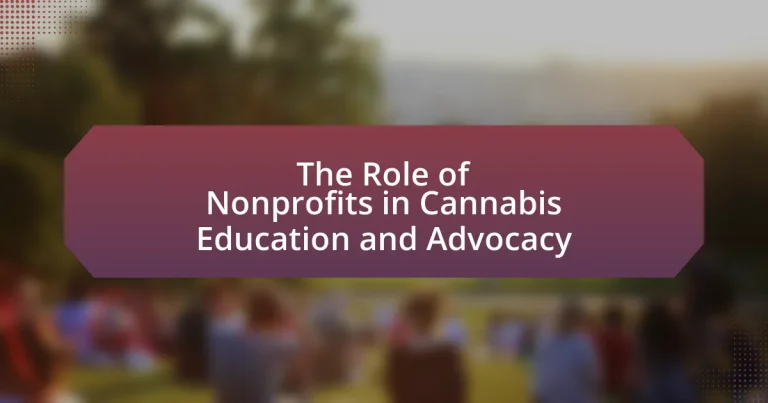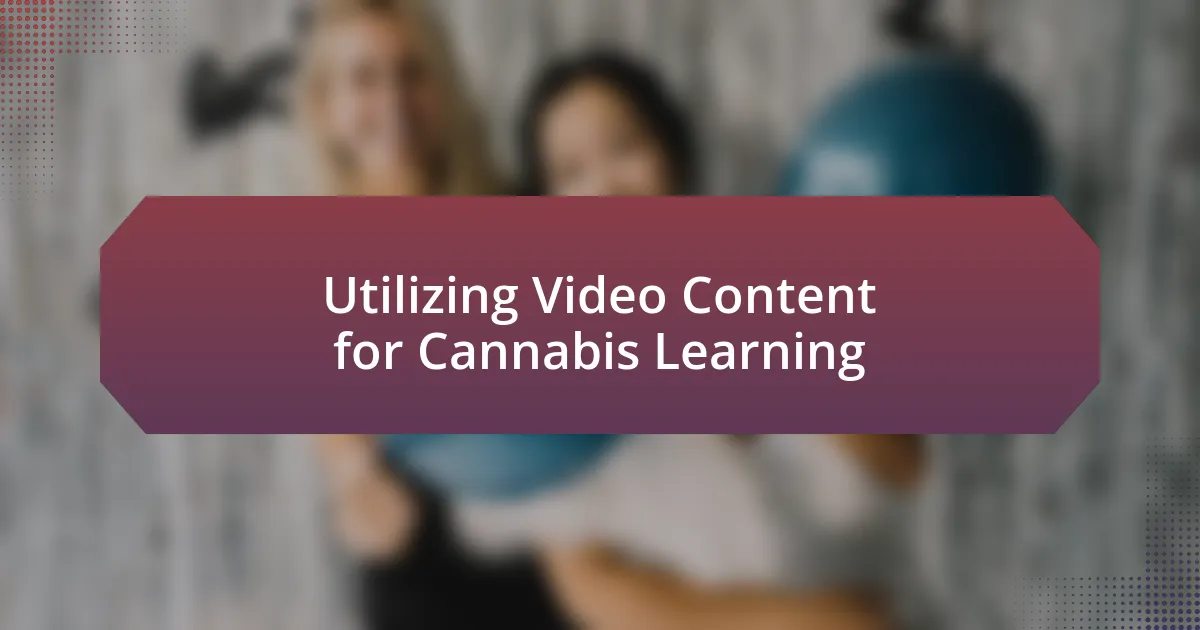Nonprofits play a vital role in cannabis education and advocacy by providing accurate information, promoting responsible use, and influencing policy changes. They conduct research, develop educational programs, and engage in community outreach to raise awareness about cannabis benefits and risks. Key organizations, such as the National Organization for the Reform of Marijuana Laws (NORML) and the Marijuana Policy Project, have been instrumental in advocating for legislative reforms and shaping public perception. Despite facing challenges like legal restrictions and funding difficulties, nonprofits continue to collaborate with various stakeholders to enhance cannabis education and advocate for social justice and equitable access in the evolving landscape of cannabis legislation.
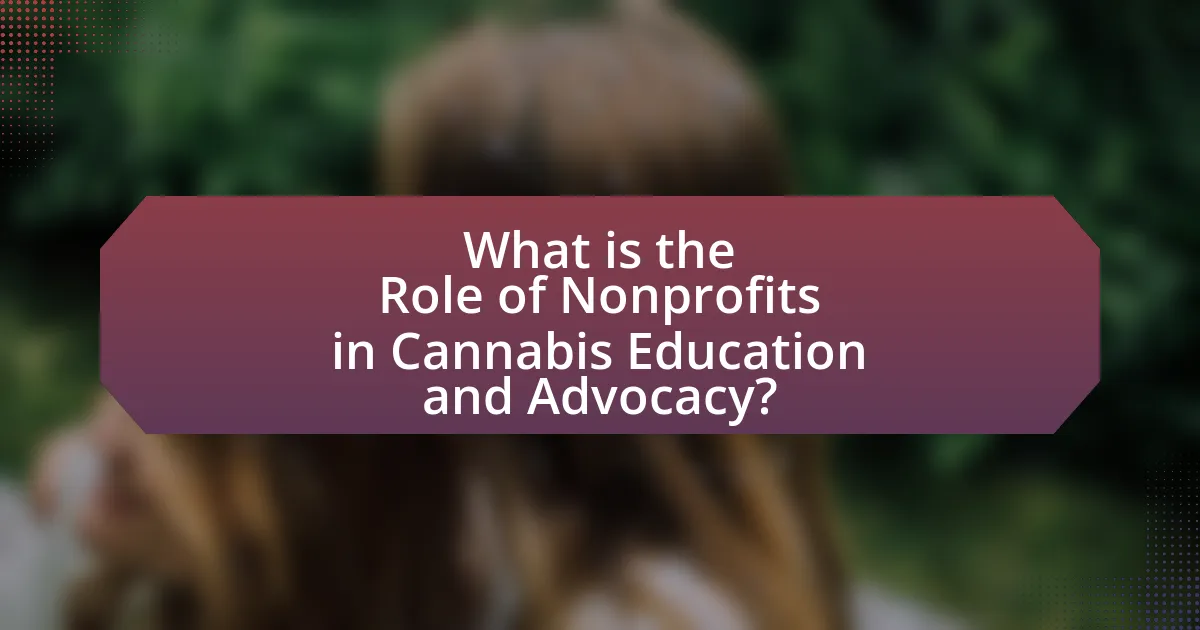
What is the Role of Nonprofits in Cannabis Education and Advocacy?
Nonprofits play a crucial role in cannabis education and advocacy by providing accurate information, promoting responsible use, and influencing policy changes. These organizations often conduct research, develop educational programs, and engage in community outreach to raise awareness about the benefits and risks associated with cannabis use. For instance, the National Organization for the Reform of Marijuana Laws (NORML) has been instrumental in advocating for legislative reforms and educating the public about cannabis legalization. Their efforts have contributed to significant changes in cannabis laws across various states, demonstrating the impact nonprofits have on shaping public perception and policy regarding cannabis.
How do nonprofits contribute to cannabis education?
Nonprofits contribute to cannabis education by providing resources, organizing community outreach programs, and advocating for informed policy changes. These organizations often develop educational materials that clarify the benefits and risks associated with cannabis use, targeting various demographics to ensure comprehensive understanding. For instance, the National Organization for the Reform of Marijuana Laws (NORML) has been instrumental in disseminating research and information about cannabis legalization and its implications. Additionally, nonprofits frequently host workshops and seminars that engage the public, fostering dialogue and awareness around cannabis-related issues. This multifaceted approach not only enhances public knowledge but also supports evidence-based policy advocacy, as seen in initiatives led by groups like the Marijuana Policy Project, which aim to reform cannabis laws based on informed public opinion and scientific research.
What educational programs do nonprofits offer related to cannabis?
Nonprofits offer a variety of educational programs related to cannabis, including workshops, seminars, and online courses focused on cannabis cultivation, medicinal uses, legal regulations, and responsible consumption. For instance, organizations like the National Organization for the Reform of Marijuana Laws (NORML) provide resources and training on cannabis policy advocacy and legal rights. Additionally, the Cannabis Certification Council offers certification programs that educate individuals on sustainable practices in the cannabis industry. These programs aim to inform the public and promote responsible use while addressing the evolving landscape of cannabis legislation and health benefits.
How do nonprofits raise awareness about cannabis-related issues?
Nonprofits raise awareness about cannabis-related issues through educational campaigns, community outreach, and advocacy efforts. These organizations often conduct workshops, seminars, and informational sessions to inform the public about the benefits and risks associated with cannabis use. For example, the National Organization for the Reform of Marijuana Laws (NORML) actively engages in legislative advocacy, providing resources and information to help shape cannabis policy. Additionally, nonprofits utilize social media platforms to disseminate information quickly and engage with a broader audience, thereby increasing visibility and understanding of cannabis-related topics.
Why is advocacy important in the cannabis sector?
Advocacy is important in the cannabis sector because it drives policy change and promotes social justice. Effective advocacy efforts have led to the legalization of cannabis in numerous states, reflecting a shift in public perception and legal frameworks. For instance, as of 2023, 21 states in the U.S. have legalized recreational cannabis, largely due to advocacy groups pushing for reform and educating the public on the benefits of cannabis use. These organizations also work to address the historical injustices associated with cannabis prohibition, advocating for equitable access and expungement of past convictions.
What are the key advocacy goals of nonprofits in cannabis?
The key advocacy goals of nonprofits in cannabis include promoting legalization, ensuring equitable access, and advocating for social justice. Nonprofits aim to influence legislation that supports the legal use of cannabis for medical and recreational purposes, as seen in states like California and Colorado where advocacy efforts have led to successful legalization. Additionally, these organizations focus on addressing the disparities faced by marginalized communities affected by past cannabis prohibition, advocating for policies that provide equitable access to cannabis markets and resources. They also work to educate the public about the benefits and risks of cannabis use, aiming to reduce stigma and misinformation surrounding the substance.
How do nonprofits influence cannabis policy and legislation?
Nonprofits influence cannabis policy and legislation by advocating for reform, educating the public, and mobilizing grassroots efforts. Organizations such as the Drug Policy Alliance and NORML (National Organization for the Reform of Marijuana Laws) actively lobby for changes in laws and regulations, providing research and data to support their positions. For example, the Drug Policy Alliance has played a significant role in the legalization of cannabis in several states by promoting evidence-based policies and engaging in public campaigns that highlight the benefits of legalization and the harms of prohibition. Their efforts have contributed to shifts in public opinion and legislative action, demonstrating the impactful role nonprofits play in shaping cannabis policy.
What challenges do nonprofits face in cannabis education and advocacy?
Nonprofits face significant challenges in cannabis education and advocacy, primarily due to legal restrictions and stigma surrounding cannabis use. These organizations often struggle to secure funding because many traditional donors and grant-making institutions are hesitant to support cannabis-related initiatives due to the ongoing federal prohibition in the United States. Additionally, nonprofits encounter difficulties in disseminating accurate information, as misinformation about cannabis persists in public discourse, complicating their educational efforts. Furthermore, navigating the complex regulatory landscape can hinder advocacy efforts, as laws vary widely by state and can change rapidly. These challenges collectively impede the ability of nonprofits to effectively educate the public and advocate for policy changes regarding cannabis.
How do legal restrictions impact nonprofit activities in cannabis?
Legal restrictions significantly limit nonprofit activities in cannabis by imposing regulations that affect funding, operations, and advocacy efforts. Nonprofits often face challenges in securing donations and grants due to the federal illegality of cannabis, which can deter potential funders concerned about legal repercussions. Additionally, these organizations may encounter restrictions on their ability to engage in lobbying or political activities related to cannabis legislation, as certain laws prohibit nonprofits from participating in political campaigns or influencing legislation. For instance, the IRS enforces rules that restrict tax-exempt organizations from engaging in substantial lobbying activities, which can hinder their ability to advocate for cannabis policy reform.
What funding challenges do nonprofits encounter in this field?
Nonprofits in the field of cannabis education and advocacy encounter significant funding challenges primarily due to the stigma associated with cannabis and the legal complexities surrounding its use. This stigma often leads to difficulties in securing traditional funding sources, such as grants from foundations and government entities, which may avoid supporting cannabis-related initiatives. Additionally, many financial institutions are hesitant to work with organizations involved in cannabis advocacy due to federal regulations, limiting access to banking services and loans. According to a report by the National Council of Nonprofits, these barriers can severely restrict the operational capacity of nonprofits, making it challenging to sustain programs and outreach efforts effectively.
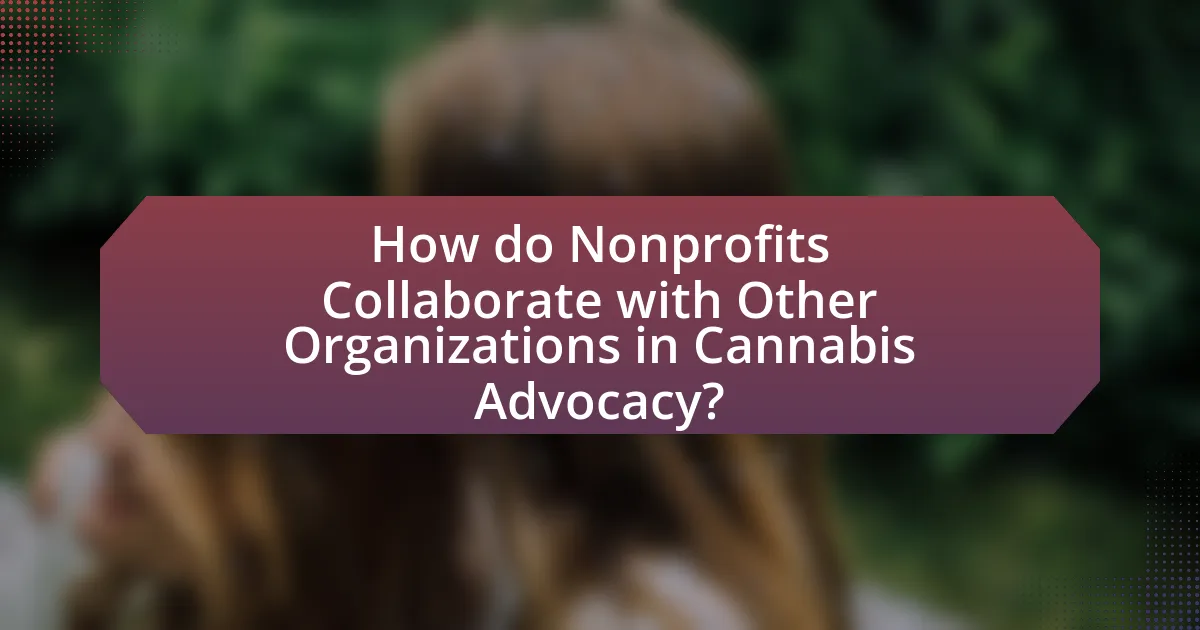
How do Nonprofits Collaborate with Other Organizations in Cannabis Advocacy?
Nonprofits collaborate with other organizations in cannabis advocacy through partnerships, coalitions, and joint initiatives aimed at promoting policy change and public awareness. These collaborations often involve sharing resources, expertise, and networks to amplify their collective impact on cannabis legislation and education. For instance, organizations like the National Organization for the Reform of Marijuana Laws (NORML) frequently partner with local advocacy groups to coordinate campaigns that address specific legislative goals, demonstrating the effectiveness of collaborative efforts in achieving common objectives.
What partnerships are common among nonprofits in cannabis advocacy?
Common partnerships among nonprofits in cannabis advocacy include collaborations with health organizations, legal reform groups, and educational institutions. These partnerships enhance advocacy efforts by combining resources and expertise to promote cannabis policy reform, public health education, and research initiatives. For instance, organizations like the National Organization for the Reform of Marijuana Laws (NORML) often partner with public health entities to address the medical benefits of cannabis, while groups like the Drug Policy Alliance work alongside legal reform advocates to push for legislative changes. Such collaborations are essential for amplifying the impact of advocacy efforts and fostering a comprehensive approach to cannabis education and policy reform.
How do collaborations enhance the effectiveness of cannabis education?
Collaborations enhance the effectiveness of cannabis education by pooling resources, expertise, and networks from various stakeholders, including nonprofits, educational institutions, and industry experts. This collective approach allows for the development of comprehensive educational programs that address diverse community needs and promote accurate information dissemination. For instance, partnerships between nonprofits and universities can lead to research-backed educational materials, ensuring that the content is credible and relevant. Additionally, collaborations can facilitate outreach efforts, reaching wider audiences and fostering community engagement, which is crucial for effective education on cannabis-related topics.
What role do coalitions play in advancing cannabis advocacy efforts?
Coalitions play a crucial role in advancing cannabis advocacy efforts by uniting diverse stakeholders to amplify their collective voice and influence policy change. These coalitions often consist of nonprofits, advocacy groups, medical professionals, and community organizations that collaborate to share resources, knowledge, and strategies. For instance, the National Organization for the Reform of Marijuana Laws (NORML) has successfully mobilized coalitions to advocate for legislative reforms, resulting in the legalization of cannabis in several states. By pooling expertise and fostering solidarity, coalitions enhance the effectiveness of advocacy campaigns, making them more impactful in shaping public perception and policy regarding cannabis.
How do nonprofits engage with the community in cannabis education?
Nonprofits engage with the community in cannabis education through workshops, informational sessions, and outreach programs. These organizations often collaborate with local health departments and educational institutions to provide accurate information about cannabis use, its benefits, and potential risks. For instance, a study by the National Institute on Drug Abuse highlights that educational initiatives led by nonprofits can significantly increase community awareness and understanding of cannabis-related issues. Additionally, nonprofits may utilize social media campaigns to reach broader audiences, ensuring that diverse community members have access to reliable cannabis education resources.
What outreach strategies do nonprofits use to connect with the public?
Nonprofits use various outreach strategies to connect with the public, including community engagement events, social media campaigns, and partnerships with local organizations. Community engagement events, such as workshops and informational sessions, allow nonprofits to directly interact with individuals, fostering relationships and disseminating information about cannabis education and advocacy. Social media campaigns leverage platforms like Facebook, Twitter, and Instagram to reach a broader audience, share educational content, and mobilize supporters. Additionally, partnerships with local organizations enhance credibility and expand outreach efforts, as these collaborations can tap into existing networks and resources. These strategies are effective in raising awareness and promoting advocacy efforts within the community.
How do nonprofits tailor their educational content for diverse audiences?
Nonprofits tailor their educational content for diverse audiences by employing strategies such as audience segmentation, culturally relevant messaging, and accessibility considerations. Audience segmentation allows nonprofits to identify specific groups based on demographics, interests, and knowledge levels, enabling them to create targeted content that resonates with each segment. Culturally relevant messaging ensures that the content reflects the values, beliefs, and experiences of different communities, which is crucial in the context of cannabis education where cultural perceptions vary widely. Additionally, nonprofits prioritize accessibility by providing materials in multiple languages, using plain language, and incorporating various formats such as videos, infographics, and interactive workshops to cater to different learning preferences. These approaches are supported by research indicating that tailored educational interventions significantly improve engagement and knowledge retention among diverse populations.
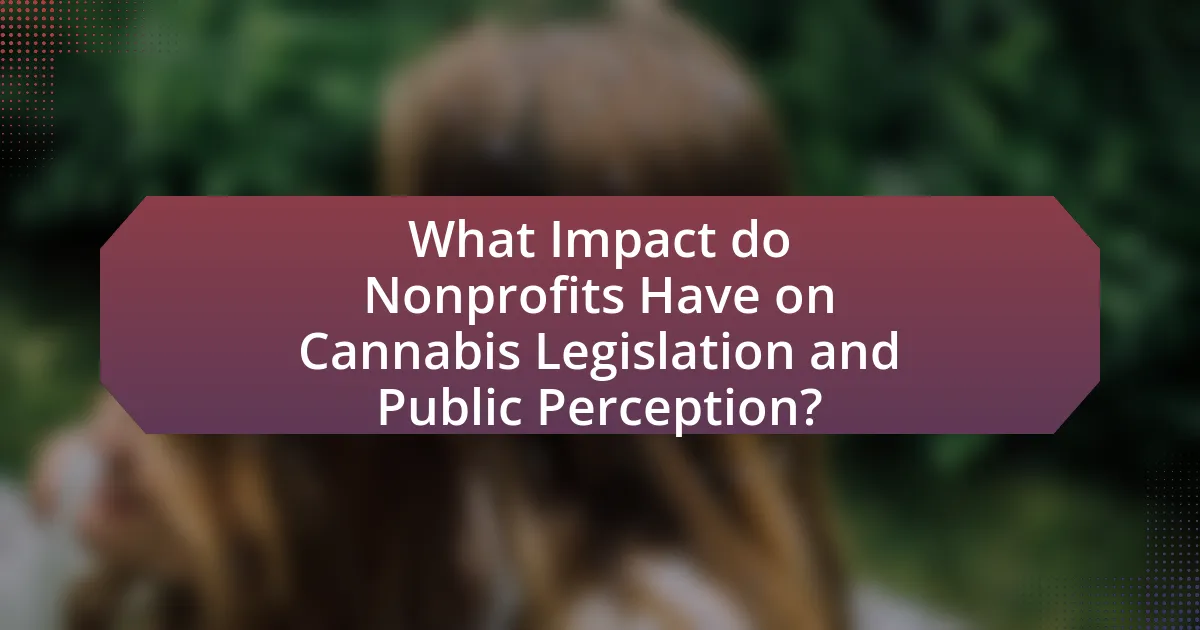
What Impact do Nonprofits Have on Cannabis Legislation and Public Perception?
Nonprofits significantly influence cannabis legislation and public perception by advocating for policy changes and educating the public. Organizations such as the Marijuana Policy Project and the Drug Policy Alliance have played crucial roles in shaping legislation by lobbying for legalization and reforming drug laws, which has led to the legalization of cannabis in multiple states. For instance, the Marijuana Policy Project was instrumental in the passage of legalization measures in states like Colorado and California, demonstrating their effectiveness in legislative advocacy. Additionally, nonprofits work to shift public perception by providing research-based information and countering stigma associated with cannabis use, as evidenced by surveys showing increased public support for legalization correlating with educational campaigns led by these organizations.
How have nonprofits shaped public opinion on cannabis?
Nonprofits have significantly shaped public opinion on cannabis by advocating for legalization and providing education on its benefits and risks. Organizations such as the Marijuana Policy Project and the Drug Policy Alliance have played crucial roles in changing perceptions through campaigns that highlight the medical uses of cannabis and the failures of prohibition. For instance, a 2021 Gallup poll indicated that 68% of Americans support legalizing cannabis, reflecting the influence of these nonprofits in shifting public attitudes over the past two decades. Their efforts in lobbying for policy changes and conducting research have contributed to a more informed public discourse surrounding cannabis, ultimately leading to legislative reforms in various states.
What campaigns have been successful in changing perceptions about cannabis?
Campaigns such as the “Marijuana Policy Project” (MPP) and “NORML” (National Organization for the Reform of Marijuana Laws) have been successful in changing perceptions about cannabis. MPP has focused on legislative reform and public education, leading to significant policy changes in states like Colorado and California, where public support for legalization increased from 30% in the early 2000s to over 60% by 2020. NORML has worked to shift public opinion through grassroots activism and educational initiatives, contributing to a decline in stigma associated with cannabis use, as evidenced by a 2019 Gallup poll showing that 66% of Americans support legalization. These campaigns have effectively utilized research, advocacy, and community engagement to reshape the narrative around cannabis.
How do nonprofits measure their impact on public attitudes towards cannabis?
Nonprofits measure their impact on public attitudes towards cannabis primarily through surveys and public opinion polls. These organizations often conduct pre- and post-campaign surveys to assess changes in perceptions and knowledge about cannabis, allowing them to quantify shifts in public attitudes. For example, a study by the Pew Research Center found that public support for cannabis legalization increased from 32% in 2010 to 60% in 2019, indicating a significant change in attitudes that nonprofits can track over time. Additionally, nonprofits may analyze social media engagement and community feedback to gauge the effectiveness of their educational campaigns, further validating their impact on public perceptions.
What are the future trends for nonprofits in cannabis education and advocacy?
Future trends for nonprofits in cannabis education and advocacy include increased collaboration with governmental agencies and a focus on evidence-based research to inform policy. As legalization expands, nonprofits are likely to partner with public health organizations to address issues such as responsible use and harm reduction. Additionally, there will be a growing emphasis on community engagement and education, particularly in underserved populations, to ensure equitable access to cannabis resources. Data from the National Organization for the Reform of Marijuana Laws indicates that informed advocacy can lead to more effective policy changes, highlighting the importance of these trends in shaping the future landscape of cannabis education and advocacy.
How might changes in legislation affect nonprofit activities in cannabis?
Changes in legislation can significantly impact nonprofit activities in cannabis by altering the legal framework within which these organizations operate. For instance, if legislation legalizes cannabis at the federal level, nonprofits may gain access to federal funding and resources, enhancing their ability to conduct educational programs and advocacy efforts. Conversely, stricter regulations could limit the scope of nonprofit activities, restricting their ability to engage in advocacy or receive donations from certain sources. Historical examples include the 2018 Farm Bill, which legalized hemp and allowed nonprofits to expand their educational initiatives related to hemp-derived products, demonstrating how legislative changes can directly influence nonprofit operations in the cannabis sector.
What emerging issues should nonprofits focus on in cannabis advocacy?
Nonprofits should focus on social equity, public health, and regulatory reform in cannabis advocacy. Social equity initiatives aim to address the historical injustices of cannabis prohibition, ensuring that communities disproportionately affected by drug laws have access to the legal cannabis market. Public health concerns include the need for research on the effects of cannabis use, particularly among vulnerable populations, to inform safe consumption practices. Regulatory reform is essential to create a fair and transparent legal framework that supports both consumers and businesses while preventing monopolistic practices. These issues are critical as they shape the future landscape of cannabis policy and its societal impact.
What best practices can nonprofits adopt for effective cannabis advocacy?
Nonprofits can adopt several best practices for effective cannabis advocacy, including building coalitions, engaging in community education, and utilizing data-driven strategies. Building coalitions with other organizations enhances resource sharing and amplifies advocacy efforts, as seen in successful campaigns like the Coalition for Cannabis Policy Reform, which united various stakeholders to influence legislation. Engaging in community education helps demystify cannabis and address misconceptions, fostering informed public discourse; for instance, educational workshops have been shown to increase community support for cannabis initiatives. Utilizing data-driven strategies, such as gathering and presenting research on the benefits of cannabis legalization, can effectively persuade policymakers and the public, as evidenced by studies indicating that states with comprehensive cannabis programs report economic benefits and reduced crime rates.
